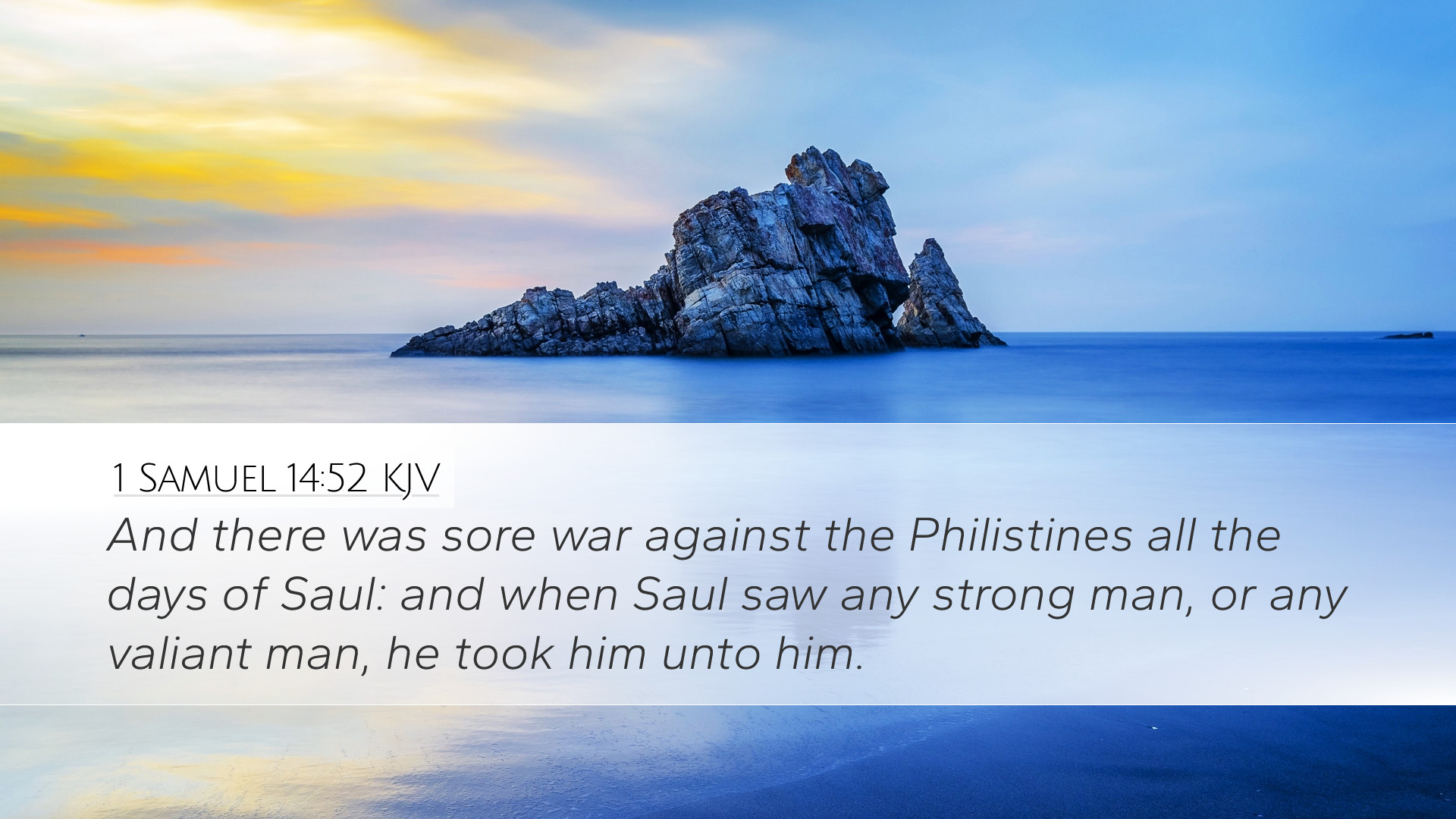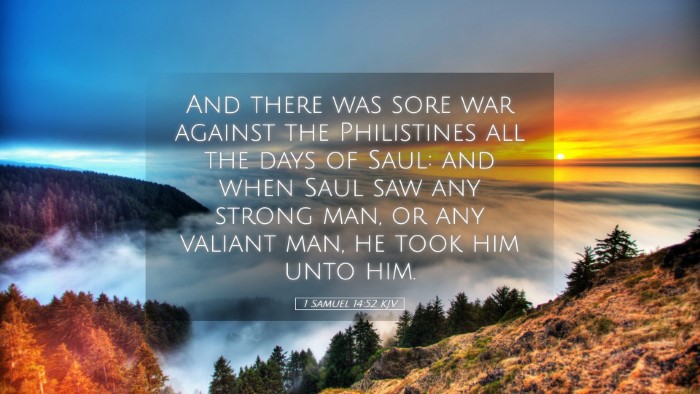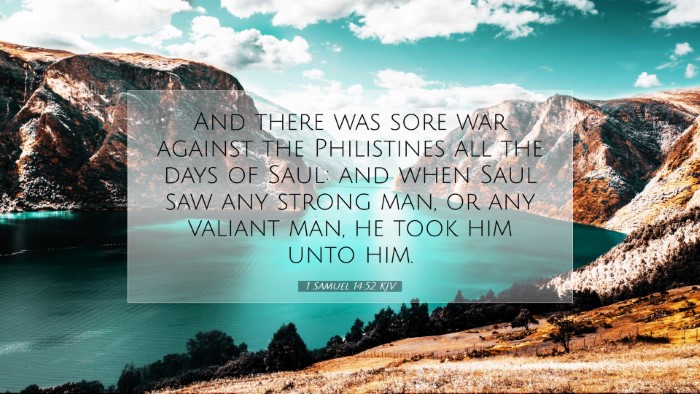Bible Commentary on 1 Samuel 14:52
Verse Focus: 1 Samuel 14:52 states, "There was sore war against the Philistines all the days of Saul: and when Saul saw any strong man, or any valiant man, he took him unto him."
Contextual Understanding
This verse comes at the conclusion of a chapter highlighting the tumultuous and violent circumstances during King Saul's reign. The persistent conflict with the Philistines establishes a backdrop that is crucial for understanding Saul's leadership dynamics and the military challenges faced by Israel during that era.
Insights from Public Domain Commentaries
Matthew Henry's Commentary
Matthew Henry reflects on the ongoing conflict mentioned in this verse. He interprets the "sore war" as indicative of the intense and persistent struggle that characterized Saul's kingship. This conflict not only reveals the hostility of Israel's enemies but also reflects the internal challenges of unity, leadership, and faith among the people.
Henry points out that Saul's response to the war was to recruit strong and valiant men, recognizing the need for capable leadership to withstand such direct threats. His actions depict a pragmatic approach to governance, albeit one that lacked spiritual underpinnings. The emphasis on recruiting 'strong' and 'valiant' men suggests a reliance on physical prowess and military strategy over divine guidance.
Moreover, Henry underscores that true strength comes from the Lord, yet Saul's approach indicates a deviation from seeking God's will, which is a recurring theme in his life. This could serve as a cautionary tale for leaders striving to honor God in their decisions.
Albert Barnes' Notes on the Bible
Albert Barnes provides a detailed analysis of the mention of the Philistines in this verse, highlighting the enduring nature of the hostilities Israel faced. He notes that the battles were not merely occasional skirmishes but a continuous struggle that required constant vigilance and readiness among the Israelites.
Barnes also points out that Saul's method of assembling a strong force reveals an understanding of military necessity. However, he critiques the fact that Saul's focus appears to lie primarily in human capabilities rather than in divine intervention. This is important as it demonstrates a potential shift in leadership ideology where human metrics are prioritized over faith-based approaches.
This commentary raises questions regarding the effectiveness of human strength without a foundation of spiritual reliance, emphasizing that the real battles are fought not just in the physical realm but also in the spiritual. Barnes aptly concludes that success in conflicts, both personal and communal, relies on God's sovereignty and not merely on human strength.
Adam Clarke's Commentary
Adam Clarke expands on the implications of this constant warfare. He suggests that the prolonged conflict against the Philistines had a shaping influence on Israeli society and government structure. Clarke notes that the ongoing military engagements likely created an atmosphere of instability that needed strong leaders, which in turn led to the centralization of power in Saul’s administration.
Clarke also emphasizes that Saul’s choice of strong men demonstrates a certain level of desperation borne from the need to protect Israel, indicating that this was not simply a time of war but a time of significant national identity formation. Saul's selection of capable warriors reflects a leader attempting to consolidate his power while also fulfilling a national need for security.
Furthermore, Clarke draws connections to Israel's greatest need—the need for godly leadership. He insinuates that while recruiting strong men is necessary, it also points to a deeper issue of spiritual decline. Clarke implies that without spiritual renewal and genuine dependence on God, Israel—and Saul—would remain vulnerable amidst their continuous strife.
Theological Reflections
As we draw from the insights of the aforementioned commentators, several theological reflections emerge regarding leadership, faith, and human reliance in times of crisis:
- The Nature of Leadership: Biblical leadership is characterized by spiritual integrity and divine reliance. Saul’s military decisions, though pragmatic, risked sidelining the need for divine guidance.
- Dependency on God: The recurring theme presented through these commentaries reminds us of the need to prioritize spiritual strength over human capabilities, especially in tough times.
- Community and Identity Formation: The continuous warfare shaped national identity and communal relationships, highlighting the importance of unity in facing external threats.
- The Implications of Human Strength: Relying solely on human strength can lead to eventual downfall, indicating a need for balance between action and spiritual dependence.
Conclusion
1 Samuel 14:52 encapsulates the essence of Saul’s leadership during a trying time for Israel. Through the examination of public domain commentaries, it becomes evident that while military might is crucial in times of war, the overarching narrative suggests that true strength is found in alignment with God's will. The ongoing war serves as a backdrop for deeper exploration of leadership values, communal identity, and the urgent call for believers to seek divine direction in the face of challenges.


